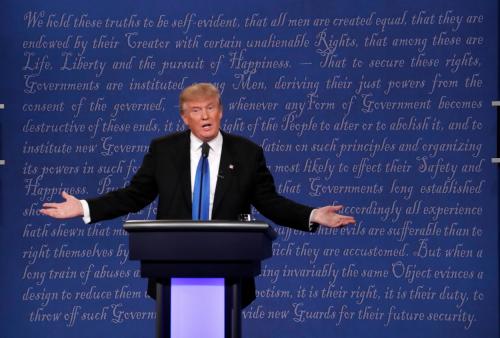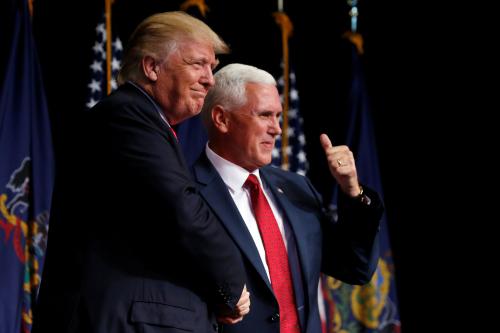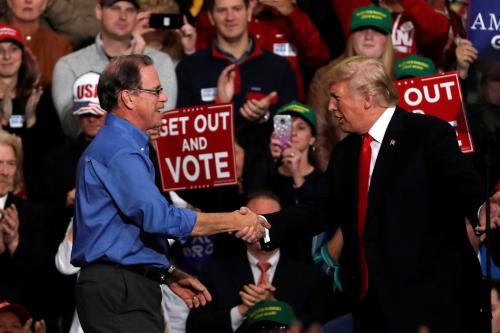If you were to apply one word to the vice-presidential debate between Kamala Harris and Mike Pence, it would be “normal.” While the debate did nothing to stop Biden’s momentum, it did harken back to an earlier era and made me wonder: Can we ever go back to normal? Or has Trump permanently changed our political life?
First, let’s try and remember what normal looked like.
Start with the debate. Neither candidate interrupted each other constantly and for extended periods of time as President Trump did in his first debate. Pence was somewhat guiltier, perhaps trying to please his boss. Each candidate had facts and figures at their fingertips and attacks on the other’s presidential candidate drawn from each one’s record. Or if they couldn’t do that, they simply ignored the question and talked about something else.
Pence had to dance around the health care questions; Harris around whether she was in favor of increasing the number of Supreme Court justices. They each articulated the core tenets of their political parties. Harris kept returning to the importance of protecting people with pre-existing medical conditions with a powerful recitation that ended with “they’re coming for you.” Pence fell back on one of the oldest and most road-tested of all Republican themes: “They [Democrats] are going to raise your taxes.”
The debate itself was normal and therefore somewhat boring, which is what politics used to be for most people. If we ever get beyond Trump what else would “normal” look like?
- For starters, presidential candidates would be forced to release their tax returns, as almost all of them except for Trump have done voluntarily. So far about 20 states have considered making release of tax returns a condition of getting on the ballot. If one state passes this legislation the returns will be there for all to see and court cases are moving along in the same direction.
- Most presidents, Democratic or Republican, would probably not be enamored with dictators like Vladimir Putin of Russia or Kim Jung-un of North Korea. Nor would they hide their discussions from the national security establishment as Trump has done, feeding worries that someone like Putin has “something” (perhaps financial) on the president. Congresswoman Liz Cheney (R-WY) took Trump to task over his reluctance to call out Russia about reports that they paid bounties for killing American soldiers. Strongly supportive Republican senators such as Lindsay Graham (SC) have broken with Trump on Russia, Saudi Arabia, and Syria. Future presidents, including Republicans, would likely refrain from insulting our allies, instead using back channels and standard diplomacy to try and coax them into doing what we want. A normal president would not decide to pull American troops out of places around the world without consulting military commanders. They also would not continually praise the military in public and insult them in private.
- When trying to undo a popular piece of legislation from his predecessor, a normal president would actually develop new legislation. Trump has spent his entire first term trying and then failing to undo Obamacare. When it was pointed out just how popular Obamacare is, especially the prohibitions that prohibit discrimination on the basis of pre-existing conditions, he put together a lengthy executive order that is mostly a defense of his health care record. (This issue is so important politically that House Speaker Nancy Pelosi attributed the 2018 Democratic takeover of the House to “Mr. Pre-existing Condition.”) But the section on pre-existing conditions in Trump’s executive order is thin gruel; there is no “how” in it. It is merely aspirational, lacking a plan for actually making it happen. Here’s the critical section.
Sec. 2. Policy. It has been and will continue to be the policy of the United States to give Americans seeking healthcare more choice, lower costs, and better care and to ensure that Americans with pre-existing conditions can obtain the insurance of their choice at affordable rates.
- A normal president would not trash long-standing democratic norms, as Trump did when he refused to say that he’d accept the results of the election. Pence was forced to follow his leader with the following change-the-subject response: “When you talk about accepting the outcome of the election, I must tell you, Senator, your party has spent the last three and a half years trying to overturn the results of the last election. It’s amazing.”
- A normal president would try empathy once in a while. Trump doesn’t do empathy—especially not for the over 200,000 people who have died of COVID-19. And beyond Trump it will be hard to find a president who never develops a pandemic plan. There have been many Republican Governors who ignored Trump’s lead on how to deal with COVID-19. In addition to Governor Charlie Baker of Massachusetts and Governor Larry Hogan of Maryland, both very blue states, Governor Mike DeWine of Ohio adopted a very careful COVID strategy and did not suffer politically.
- Lying continuously about issues big and small would not be part of a normal presidency. In July the Washington Post reported that Trump had made more than 20,000 false or misleading statements to date. Following the presidential debate, Daniel Dale, the 35-year-old fact checker on CNN got out of breath trying to recount all the times Trump got things wrong. Nor would a normal president compare himself to Abraham Lincoln and Winston Churchill, two giants of history.
There is no doubt that we’ve never had a president like this one. The question is, will we have one in the future? Once Trump is no longer president will his enablers in the Republican party begin to act more responsibly? Will they continue to be so afraid of getting “primaried” that they resort to the demented hostility that has characterized the Trump era? Or will they turn into a bunch of mini-Trumps? Young Republicans like Tom Cotton and Josh Hawley are clearly waiting in the wings and they could turn out to be more competent versions of Trump minus some of the president’s bizarre behavior.
Vice President Mike Pence did not deliver a strong enough blow to turn this presidential race around. But he did well enough to position himself for the future. He is a hardcore conservative without the rough edges and incompetence that has made even Republicans cringe at the endless confusion, contradictions and self-aggrandizement that comes from Trump.
Pence simply is much more normal, and my bet is for a return to normal. In the short run it may be the Democrats, and in the long run it could be Pence. America in 2020 is a country craving normalcy. Restaurants, ball games, and movie theaters are all on the list—and politics too.







Commentary
Beyond Trump: Six things that could signal a return to political normalcy
October 8, 2020